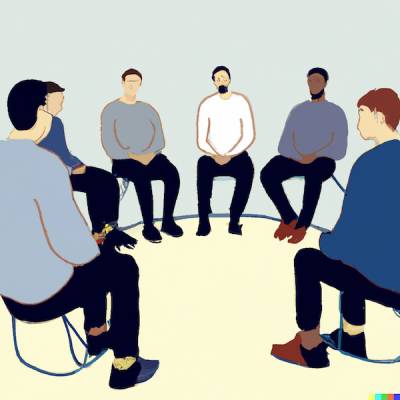
“Who looks outside dreams; who looks inside awakes.”
- Carl Jung
About Mens Groups
These groups challenge societal expectations and stereotypes surrounding masculinity, empowering men to explore alternative ways of being and fostering a sense of community and belonging. By engaging in men's groups, individuals can experience a range of benefits that positively impact their lives and relationships.
Men's groups, also known as men's support groups or men's circles, provide numerous benefits for participants. Here are some of the benefits commonly associated with men's groups:
1. Emotional support: Men's groups create a safe and non-judgmental space where men can share their feelings, challenges, and experiences. This emotional support helps men navigate through various life situations and develop healthier emotional well-being.
2. Connection and belonging: Men often face societal pressures to be self-reliant and independent, which can lead to isolation and loneliness. Men's groups offer a sense of connection and belonging by bringing together like-minded individuals who can relate to each other's experiences.
3. Personal growth and self-reflection: Men's groups provide an opportunity for self-reflection and personal growth. Through sharing and listening, men can gain insights into their own patterns, beliefs, and behaviors, and work towards positive change and personal development.
4. Accountability and motivation: Men's groups often involve setting goals and holding each other accountable. This structure can help participants stay motivated and focused on their personal and professional endeavors. The group members can provide support, encouragement, and gentle challenges to push each other forward.
5. Increased self-awareness: Men's groups encourage introspection and self-awareness. By engaging in open and honest conversations, men can gain a better understanding of their own thoughts, emotions, strengths, and weaknesses. This self-awareness can lead to improved decision-making and more fulfilling relationships.
6. Learning and skill development: Men's groups can provide opportunities for learning and skill development. Participants can share their knowledge, experiences, and expertise, creating a collaborative learning environment where members can acquire new insights, perspectives, and practical skills.
7. Breaking stereotypes and challenging toxic masculinity: Men's groups often challenge societal stereotypes and expectations placed on men, promoting healthier and more diverse expressions of masculinity. By exploring alternative ways of being a man, participants can contribute to dismantling toxic masculinity and cultivating healthier relationships with themselves and others.
8. Community and social impact: Men's groups can extend their reach beyond the individual members. They can engage in community projects, social activism, or mentoring initiatives to make a positive impact on society. By working collectively, men's groups can address issues related to mental health, gender equality, and social justice.
It's important to note that the benefits of men's groups may vary depending on the specific group's structure, facilitation, and the needs of the participants.